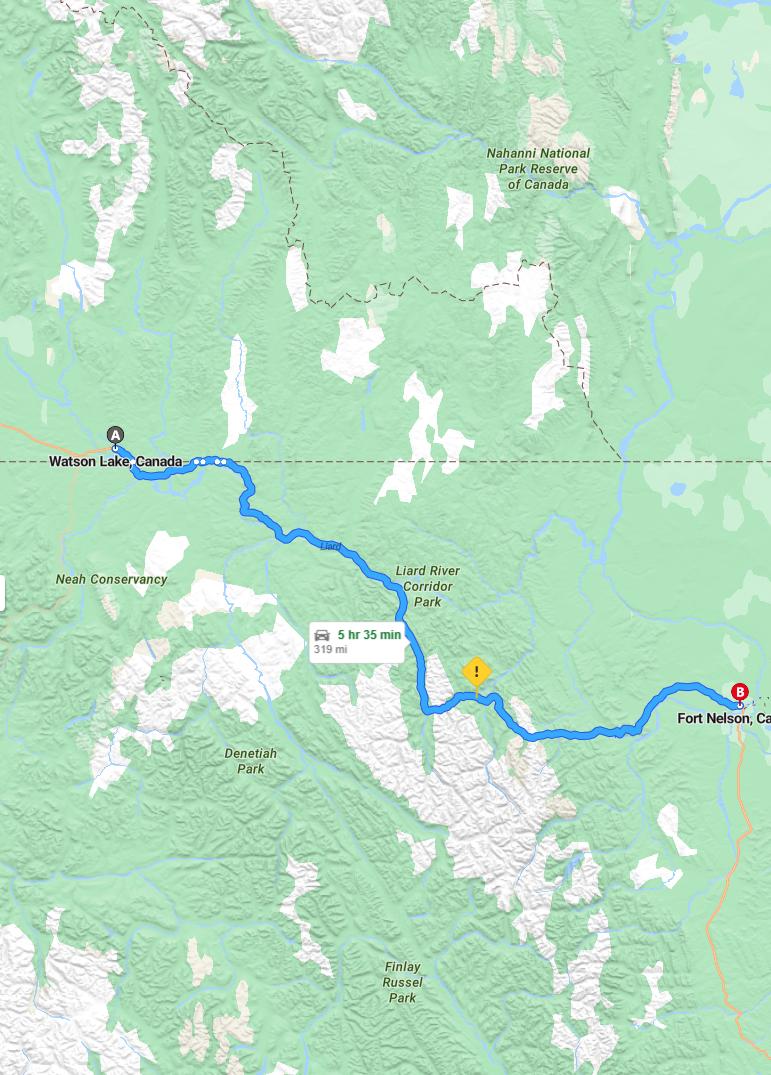Distance and estimated driving time
Driving from Watson Lake to Fort Nelson covers approximately 319 miles along the YT-97 and BC-97 routes. The journey is estimated to take around 5 hours and 35 minutes, offering travelers a scenic drive through Northern British Columbia and Yukon. This route provides a relatively direct path between the two locations, making it convenient for road trips. Ensure your vehicle is prepared, and consider stopping for rest and sightseeing along the way to enhance your travel experience.
Driving route
Traveling from Watson Lake to Fort Nelson offers a scenic journey through the stunning wilderness of northern British Columbia. The route begins in Watson Lake, known for its famous Sign Post Forest, and continues along the Liard River, which provides picturesque views and opportunities for wildlife spotting. As you approach Fort Nelson, you'll traverse expansive boreal forests and open terrains that showcase the region's natural beauty. This drive is a popular choice for travelers exploring the rugged landscapes of the Yukon and northern British Columbia. Overall, the trip combines cultural landmarks with breathtaking scenery, making it an memorable adventure in Canada's wilderness.

Road conditions and seasonal considerations
Traveling from Watson Lake to Fort Nelson, drivers should be prepared for varying road conditions and seasonal challenges. During winter months, icy and snow-covered roads are common, necessitating cautious driving and winterized vehicles. Spring and fall may bring muddy or slick surfaces due to fluctuating temperatures, while summer generally offers improved driving conditions with dry, firm roads. It is essential to check current weather forecasts and road updates regularly, especially in winter, to ensure a safe and smooth journey through this remote region.
Travel safety tips and precautions
When traveling from Watson Lake to Fort Nelson, safety should always be a priority. Ensure your vehicle is well-maintained and equipped with emergency supplies, including food, water, and a first aid kit. Be mindful of changing weather conditions and drive cautiously on remote, less-paved roads like those near Liard River. Additionally, inform someone about your travel plans and estimated arrival time, especially when venturing through isolated areas, to ensure help can be reached if needed.
Points of interest along the route
Traveling from Watson Lake to Fort Nelson offers a scenic journey through northern British Columbia with several notable points of interest. Starting in Watson Lake, visitors can explore the famous Sign Post Forest, a unique attraction featuring thousands of signs from around the world. As you pass through the Liard River area, the Liard River Hot Springs Provincial Park provides a relaxing stop to enjoy theWen Quan and observe diverse wildlife. Approaching Fort Nelson, travelers can visit the Northern Lights Centre to learn about celestial phenomena and enjoy panoramic views of the surrounding wilderness.
Fuel stations and rest stops
Traveling from Watson Lake to Fort Nelson along the scenic route offers limited but essential fuel stations and rest stops. In Watson Lake, travelers can fuel up and grab supplies before heading north, while the Liard River area provides a welcome opportunity for a brief rest and scenic viewing. Once past Liard River, fuel stations become scarce, so it's advisable to fill up beforehand and carry emergency supplies. Near Fort Nelson, additional fuel and amenities are available to ensure travelers are well-prepared for their onward journey through this remote yet beautiful wilderness.
Weather forecast and potential hazards
Traveling from Watson Lake to Fort Nelson, travelers should prepare for variable weather conditions, as the route passes through northern regions with unpredictable climates. The forecast indicates possible sudden snowfalls or rain, especially near the Liard River area, which can reduce visibility and make roads slippery. Ferocious wildlife activity and occasional falling rocks pose additional hazards, particularly in remote sections of the route. It is advisable to check local weather updates before departure, carry emergency supplies, and drive cautiously to ensure safety along this scenic but potentially challenging journey.
Vehicle preparation and maintenance tips
Before embarking on the drive from Watson Lake to Fort Nelson, it is essential to ensure your vehicle is properly prepared and maintained. Check all fluid levels, including oil, coolant, and brake fluid, to prevent breakdowns in remote areas like the Liard River stretch. Inspect tire pressure and tread to ensure optimal traction and safety on long, potentially rugged roads. Additionally, verify that your emergency kit is stocked with essentials such as a first-aid kit, extra food and water, and communication devices, to stay prepared for any unforeseen circumstances along this scenic yet remote route.
Local regulations and driving laws
When driving from Watson Lake to Fort Nelson, travelers should familiarize themselves with local regulations and driving laws in British Columbia and Yukon. Speed limits are typically posted and must be adhered to, with stricter enforcement in remote areas. It is important to carry valid identification and vehicle documents, as well as provisions for safety, such as emergency kits. Additionally, drivers should respect wildlife and remain cautious on the highway, especially in remote sections like the Liard River area, to ensure both safety and compliance with regional traffic laws.
Accommodation options in Fort Nelson
Fort Nelson offers a variety of accommodation options for travelers, including cozy motels, established hotels, and boutique inns, suitable for different budgets and preferences. Many accommodations provide amenities such as complimentary breakfast, Wi-Fi, and comfortable rooms ideal for rest after a day of traveling. Some options also include RV parks and campgrounds for those seeking outdoor experiences. Advance reservations are recommended, especially during peak seasons, to ensure a comfortable stay in this northern community.
